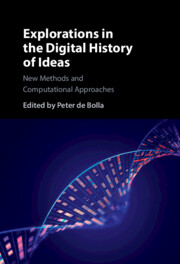Book contents
- Explorations in the Digital History of Ideas
- Explorations in the Digital History of Ideas
- Copyright page
- Contents
- Figures
- Tables
- Contributors
- Acknowledgements
- Part I Computational Methodologies for the History of Ideas
- Part II Case Studies in the Digital History of Ideas
- 4 The Idea of Liberty, 1600–1800
- 5 The Idea of Government in the British Eighteenth Century
- 6 Republicanism in the Founding of America
- 7 Enlightenment Entanglements of Improvement and Growth
- 8 The Idea of Commercial Society: Changing Contexts and Scales
- 9 The Age of Irritability
- 10 On Bubbles and Bubbling: The Idea of ‘The South Sea Bubble’
- 11 Embedded Ideas: Revolutionary Theory and Political Science in the Eighteenth Century
- 12 Computing Koselleck: Modelling Semantic Revolutions, 1720–1960
- Index
4 - The Idea of Liberty, 1600–1800
from Part II - Case Studies in the Digital History of Ideas
Published online by Cambridge University Press: 09 November 2023
- Explorations in the Digital History of Ideas
- Explorations in the Digital History of Ideas
- Copyright page
- Contents
- Figures
- Tables
- Contributors
- Acknowledgements
- Part I Computational Methodologies for the History of Ideas
- Part II Case Studies in the Digital History of Ideas
- 4 The Idea of Liberty, 1600–1800
- 5 The Idea of Government in the British Eighteenth Century
- 6 Republicanism in the Founding of America
- 7 Enlightenment Entanglements of Improvement and Growth
- 8 The Idea of Commercial Society: Changing Contexts and Scales
- 9 The Age of Irritability
- 10 On Bubbles and Bubbling: The Idea of ‘The South Sea Bubble’
- 11 Embedded Ideas: Revolutionary Theory and Political Science in the Eighteenth Century
- 12 Computing Koselleck: Modelling Semantic Revolutions, 1720–1960
- Index
Summary
This chapter uses methods in text mining in order to trace the history of the idea of liberty between 1600 and 1800. It seeks to investigate the standard account of this idea developed most rigorously by Quentin Skinner over many years. Using quantitative methods and the tools created by the Cambridge Concept Lab, it discovers a slightly different history from the standard accounts that complements and augments that history.
- Type
- Chapter
- Information
- Explorations in the Digital History of IdeasNew Methods and Computational Approaches, pp. 79 - 97Publisher: Cambridge University PressPrint publication year: 2023



